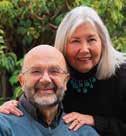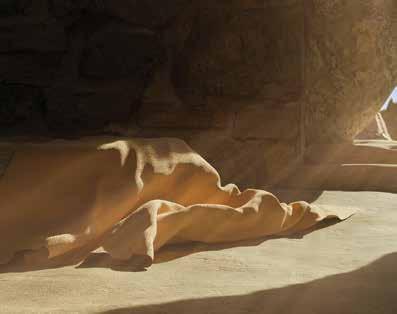
Why the Resurrection makes all the difference
I Saw, I Touched, I Believed
The story of Thomas I Know Where I’m Going
The assurance of everlasting life
CHANGE YOUR LIFE. CHANGE YOUR WORLD.
CELEBRATING EASTER
Vol 25 • Issue 3


PERSONALLY SPEAKING jesus, the Risen Savior
Johanna-Ruth Dobschiner was a young Jewish woman who survived the WWII German occupation of the Netherlands by hiding in attics and behind false walls in the homes of the members of the Dutch resistance. It was during the long, tedious hours hidden upstairs in the home of Bastian Johan Ader, the pastor of a small church and leader of an “underground” cell, that Johanna-Ruth took a Bible from his bookshelf and began to read it from cover to cover.
In the Old Testament she read the stories that she had often heard in her Orthodox Jewish home. But then, to her surprise, the Bible had a second part, the New Testament. Starting with the Gospels, she read the amazing story of the man named Jesus! As she read, she imagined that she was one of His disciples following Him throughout Palestine. She was sure that He was the Messiah and could not understand how no one had ever told her about Him!
So heartbroken was she to read about His crucifixion, death, and burial that she closed the Bible and mourned for seven days, as was the Jewish custom. It was sometime later, when she decided to continue reading from where she had left off, that she excitedly discovered that Jesus had risen from the dead! He was the Messiah after all! After reading the stories of the first Christians in the book of Acts, she saw that Christ, through the Holy Spirit, lives on within us, and so she surrendered her heart and life to Jesus.
This year’s Easter issue of Activated explores the meaning of the resurrection. In the article “I Saw, I Touched, I Believed,” Curtis Peter van Gorder depicts the transformation of “Doubting Thomas” to “Thomas, the Apostle” when he touched the resurrected Christ. You will surely enjoy the article by Peter Amsterdam, which is a detailed examination of Christ as the Son of God and long-awaited Messiah.
This Easter let us share Johanna-Ruth’s joy upon discovering the resurrected Christ, and help others come to know Him as well.
Gabriel and Sally García Activated Editorial Team
For more information on Activated , visit our website or write to us.
Website: activated.org
Email: activated@activated.org
Local contacts:
South Africa:
Email: activated@helpinghandsa.org
India:
Email: activatedindia@activated.org
Nigeria:
Cell: +234 (0) 7036963333
Email: activatednigeria@activated.org
Philippines:
Cell: (0922) 8191142
Email: activated.phils@gmail.com
© 2024 Activated. All Rights Reserved. Designed by Gentian Suçi.
All scripture quotations, unless otherwise indicated, are taken from the English Standard Version (ESV). Copyright © 2001 by Good News Publishers. Used by permission.
Vol 25, Issue 3
2
THE MIRACLE OF HOPE
By Joyce Suttin

I believe in resurrection. I believe in butterflies bursting out of the death grip of cocoons. I believe in seeds from dying flowers falling into the ground to be reborn and to surround us once again with beauty. I believe the darkest night leads us back into the sunshine, and seasons turn from winter’s sleep to spring’s awakening. All of nature teaches us a lesson of hope.
I went out for a walk early this morning after a storm. The skies were still dark. I only went because the meteorologist confirmed that the storm was over. I left the house amidst gray skies and mist falling from branches as I walked below them.
I walked a mile, and as I looked around, I felt the wind become stronger. I thought maybe the weather prediction had been wrong. Maybe the storm would come again. But then I looked up and saw a tiny touch of sun. That made me happy, and as I continued on my way, I prayed for all the loved ones I wouldn’t be able to see this holiday. Then I felt warmth and I looked up to see a cloudless sky. It was perfectly clear, and it happened so suddenly. I looked around to see where the clouds had gone, but they were nowhere in sight. The sun had worked a little miracle for me. I was so thankful I had walked by faith and not
by sight, and as a result, I had the blessing of seeing this gorgeous day emerge after the storm.
It is precious to observe the clean-swept world after a storm. The air is purer. The sky is more brilliant. People are kinder and a touch gentler to others. It is beautiful to see the sun shining after the rain. It can bring a feeling of gratitude as we are reminded that the Lord cares for us and shelters us through the storm.
This morning I could have chosen to hide away at home and mourn the day alone. But I decided to venture out, and the Lord gave me a special blessing. God shows His power, beauty, and mercy through His creation, and we can learn so much from it. Unfortunately, however, we often get so busy with the many cares and demands of everyday life that we don’t take the time to stop, hear the birds, watch the clouds, and be reminded that God protects His creatures great and small.
May He bless you today and may you take a moment to feel the miracle of hope!
Joyce Suttin is a retired teacher and writer and lives in San Antonio, USA. Check out her blog at joy4dailydevotionals.blogspot.com ■
3
CELEBRATING EASTER
—Why the Resurrection Makes All the Difference
By Peter Amsterdam
Every time we celebrate Easter, we are commemorating God’s gift of salvation. In His love for humanity, God made a way for us to enter into an eternal relationship with Him through His Son. Jesus came into this world out of love, lived as we live, and gave Himself over to be crucified and to suffer for our redemption. His death made it possible for us to truly know God and to live with Him forever.
We know that Jesus is God’s Son because of the accounts of Him given in the Gospels. He did and said numerous things which spoke to the fact that He is God’s Son. His resurrection from the dead, which we celebrate every Easter, is proof that He is all that He said He was—that He is the long-awaited Messiah and God the Son.
While on occasion Jesus stated that He was the Messiah, He generally didn’t refer to Himself as such. The title of Messiah carried with it preconceived ideas in the minds of the people of His day and


expectations of a political nature. Claiming to be the Messiah would most likely have prematurely brought about conflict with the Jewish leaders and the Roman government. It would also have brought up expectations for the Messiah as someone who would throw off the shackles of the Roman oppressors and physically deliver the Jewish people.
Jesus referred to Himself as the Son of Man over seventy times throughout the Gospels, a non-messianic title from the book of Daniel that the Jews of His day were familiar with (Daniel 7:13–14). By referring to Himself as the Son of Man, Jesus could speak of His mission on earth—which included His suffering and death, His second coming, His role in judgment, and His glorious future— without using the politically charged title of Messiah.
Within the Gospels, Jesus was the only one who used the title Son of
4
Man in reference to Himself. He used the title to claim the authority to do what only God could do, such as forgive sins. “But that you may know that the Son of Man has authority on earth to forgive sins”—He then said to the paralytic—“Rise, pick up your bed and go home” (Matthew 9:6). He also referred to Himself this way when telling His disciples about His coming crucifixion and resurrection on the third day (Matthew 17:22–23).
Jesus foretold that as the Son of Man, He would lay down His life for our redemption: “The Son of Man came not to be served but to serve, and to give His life as a ransom for many” (Matthew 20:28). And so He was crucified, died, and was buried—and then rose from the dead. It is His sacrificial atoning death that has given us eternal life (1 Peter 2:24).
Another way in which Jesus used the phrase the Son of Man was when speaking of His second coming, when He will return to the earth to establish His rule and to pronounce judgment. The book of Daniel speaks of “one like a son of man” coming on the clouds of heaven (Daniel 7:13). This reference to a human-looking figure with authority, glory, worship, and an eternal kingdom evokes an image of power normally reserved for God.

Jesus is also referred to as the Son of God, both by Himself and by others. His Sonship is woven throughout the Gospels, especially in the things He said about Himself. From the Gospels we understand that He existed eternally with the Father before the creation of the world as the Word of God, and that He made all things. The Word then became a human being, in the person of Jesus, who through the life He led taught
us about God and His love. “And the Word became flesh and dwelt among us, and we have seen his glory, glory as of the only Son from the Father, full of grace and truth” ( John 1:14).
We are told of His Sonship in the birth narratives, where His paternity comes directly from God through the conception of the Holy Spirit, and therefore He is called the Son of God (Luke 1:31–35). He was named Jesus, which means “Yahweh is salvation”—Yahweh being one of the names by which the Jewish people know God.
When Jesus was baptized by John the Baptist in the River Jordan at the beginning of His mission, the voice of God stated, “This is My beloved Son, with whom I am well pleased” (Matthew 3:16–17). Close to the end of His mission, when He was transfigured, God once again declared that He was His Son (Matthew 17:5).
Jesus had a unique relationship with the Father through knowing Him as only His one and only Son could. When asked by the Jewish leadership if He was the Son of God, He answered

5

in the affirmative: “The high priest asked Him, ‘Are You the Christ, the Son of the Blessed?’ And Jesus said, ‘I am, and you will see the Son of Man seated at the right hand of Power, and coming with the clouds of heaven’” (Mark 14:61–62).
The statements Jesus made about Himself and His relationship to God, claiming to be equal to God, at times accepting worship (Matthew 14:33), and claiming to do the work of the Father were seen as outlandish and blasphemous by those who opposed Him. The Jewish religious leaders considered Him a false messiah and came to the conclusion that He needed to die so that the Romans wouldn’t destroy the nation because of Him ( John 11:47–50). While the Jewish leaders didn’t have the authority to kill Jesus themselves, they were able to have Him crucified by the Roman authorities. The supposed false messiah who claimed to be God’s Son was crucified, and the problem was seemingly taken care of.
But then … He rose from the dead. And His resurrection proved that all He said He was, all the authority He claimed to have—the messiahship, the power and dominion, and His Sonship—was genuine. Jesus is who He said He was.
Had Jesus not risen, had there been no resurrection, then everything that God’s Word says about Him would be false. Our faith, as Paul said, would be worthless (1 Corinthians 15:14). But the resurrection proves that our faith is of inestimable worth. It proves that Jesus is God the Son.
Because of the resurrection, we are assured that through belief in Jesus we have eternal life. That’s what Easter is all about. That’s why it’s a day to praise and thank Him for His great sacrifice, for laying down His life for us. That’s why it’s a day to worship God for the wonderful plan
of salvation which He enacted. That’s why Easter is a wonderful day to make a personal commitment to share the good news that Jesus is risen and His free offer of salvation is available to all who will receive it. Happy Easter!
Peter Amsterdam and his wife, Maria Fontaine, are directors of the Family International, a Christian community of faith.
Adapted from the original article. ■

Let not your heart be troubled, Let not your soul be sad.
Easter is a time of joy
When all hearts should be glad.
Glad to know that Jesus Christ Made it possible for men To have their sins forgiven And, like Him, to live again.
So at this special time of year, May the wonder of His story Renew our faith so we may be Partakers of His glory!
—Adapted from Helen Steiner Rice
6
GOOD LITTLE HOUSE
By Marie Alvero

Recently we bought a 1960s tiny house as an investment property. I honestly wonder if we are good investors because this little house project hasn’t gone as we had hoped. It’s been so much time, money, and grief, and not a ton of payoff.
When we purchased it, we knew it would need a lot of rehab, so my husband and I worked on it every weekend last summer. Did I mention that this is a house with no air conditioning in the dead of a Texas summer? We were gross and sweaty and grouchy and broke, but we were investing all our dollars and our elbow grease because we thought this house would be a worthy investment in our future. Though the actual return on our investment is still to be determined, this is the principle of investing: You find potential in an old, ugly, little house and you put in time and money with the hope that it will eventually be worth the sacrifice.
Ever wonder what it is about you and me that makes Jesus think, “That was worth My sacrifice!” Romans 5:8 says, “God shows his love toward us in that while we were yet sinners, Christ died for us.” He did that before we were
The nail-pierced hands of Jesus reveal the love-filled heart of God.
—Author unknown
cleaned up, before we appeared worthy, before we showed promise. This is the most amazing truth! Because God loves us, every human being has an inestimable value, not because of our own worth, but because of His love.
When I take time to reflect on this, the awe hits me. Sometimes I forget. Sometimes I am so caught up in this world that I forget that I would be dead in sin, separated from God, without hope or love or grace, if Jesus had not carried the weight of my sin. But because of Jesus’ sacrifice on the cross, I am adopted as a child of God.
I am not an old house that needs to be restored before I have value. I already have value because Christ died for me. Reach for that joy and understanding with me!
Marie Alvero is a former missionary to Africa and Mexico. She currently lives a happy, busy life with her husband and children in Central Texas, USA. ■
7
THE POWER OF FORGIVENESS
By Simon Bishop
Forgiveness is such a big and multifaceted subject. I’ve read much on the topic over the years, yet I continue to find room for growth as opportunities arise to put what I’ve learned into practice.
On the side of forgiving others, a lot has been published in recent years on the psychological and emotional benefits of being able to forgive. It can free a person from anger, anxiety, bitterness, etc. It can help a person move on with life and not be held back by the past. All this is true and should provide motivation to each of us to extend forgiveness, even if just for the benefits to ourselves, even when we don’t feel like it.
But as followers of Christ we have another reason to forgive, a greater one. It is that we have been forgiven by God for every sin, every mistake, every misdeed we have ever committed or ever will commit. Our slate is wiped clean. Therefore, because of this, we have an obligation before God to forgive others. This was expressed by Jesus when He was teaching His disciples to pray: “Forgive us our debts, as we

also have forgiven our debtors” (Matthew 6:12). Jesus went on to say, “For if you forgive others their trespasses, your heavenly Father will also forgive you, but if you do not forgive others their trespasses, neither will your Father forgive your trespasses” (Matthew 6:14–15).
In Matthew 18 Jesus told a story to illustrate this concept: A servant owed the king 10,000 talents. (From what I have researched, one talent has been estimated to have equaled approximately 6,000 denarii, or around 10 years of wages, so 10,000 talents would be equal to approximately 100,000 years of wages, an astronomical amount!)
When the servant couldn’t repay, the king ordered him and his family to be sold into slavery until he could pay in full what he owed. The servant fell on his face begging for time and to be shown mercy. The king saw this and decided to completely forgive the debt and free the servant from having to repay it.
While walking home, the forgiven servant met a fellow servant who owed him 100 denarii (about three and a
8

half months of wages), and he grabbed him by the throat and demanded immediate repayment. His fellow servant begged for mercy, asking for time to pay him back. But instead, he dragged the man to prison and made sure he wouldn’t get out until his debt was paid fully.
Some other fellow servants saw what had happened and reported to the king, who then called the forgiven servant and said, “‘I forgave you all that debt because you pleaded with me. And should not you have had mercy on your fellow servant, as I had mercy on you?’ And in anger his master delivered him to the jailers, until he should pay all his debt” (Matthew 18:32–34).
Jesus ends this story with these words, “So also my heavenly Father will do to every one of you, if you do not forgive your brother from your heart” (Matthew 18:35).
Sometimes I’ve heard people say that what the coworker owed was insignificant, but actually three and a half months salary is substantial. It is only insignificant in comparison, which I think is the point here. The things
Forgiveness is manifested mercy; it is love in action—not love based on a feeling, but love based on a decision, an intentional choice to obey God.
Joyce Meyer
Apple trees bear apples, wheat stalks produce wheat, and forgiven people forgive people.
Max Lucado
To forgive is to set a prisoner free and discover that the prisoner was you.—Lewis B. Smedes
In the shadow of my hurt, forgiveness feels like a decision to reward my enemy. But in the shadow of the cross, forgiveness is merely a gift from one undeserving soul to another.—Andy Stanley
we are called on to forgive others for may be very great or severe, but if we have a true idea of all that we have been forgiven for by God, then forgiving others becomes much easier.
This Easter can be a time to reflect on God’s great love and forgiveness for each one of us and to search our hearts to see if there is anyone we have not yet forgiven. Something that has helped me is to remember that forgiveness is not an emotion; we don’t have to feel like forgiving. Neither do we have to worry that something is wrong if once we forgive, we still experience negative emotions toward the person. As we continue to hold on to our decision to forgive, we can trust that those negative feelings will subside, and we will eventually have evidence that we have truly forgiven from our hearts.
Simon Bishop does full-time mission and humanitarian work in the Philippines. ■
9
“I Saw, I Touched, I Believed“
By Curtis Peter van Gorder
If Thomas could tell us what he experienced when Jesus was crucified, buried, and rose from the grave, his account might go something like this...
A lot of people read the Gospels and think how wonderful it must have been to be one of Jesus’ first disciples, especially one of the twelve whom He chose to be closest to Him while He taught and worked miracles. Those three and a half years with the Master were wonderful, because He was wonderful—perfect, in fact.
There was nothing particularly wonderful about us disciples, though, and our flaws showed all the more clearly in the light of His presence. Peter was outspoken and impetuous. James and John tended to get carried away in their zeal. Philip was a harsh realist. And me? Because I doubted God’s power after Jesus rose from the dead and I was so vocal about it, my name has become synonymous with skepticism.

my experience. If you have doubts about Jesus or the Bible, or the power of God, or the scope of His love, this story is for you.
That’s not a label I’m proud of, nor the legacy I would have chosen, but I’m happy if others can benefit from
After Jesus was crucified and His body was laid to rest, we all went into hiding for fear that His enemies would come after us next. When I saw the other disciples on the evening of the third day, I found that a lot had happened in my absence. Everyone started talking about it at the same time. “We’ve seen Jesus!” “He’s alive!” “It’s true! It really is!” “I saw Him too!”
10
Peter tried to help me understand. “We were huddled here, still trying to make sense out of what happened to the Master, when Mary came to the door out of breath.”
“We went to the tomb to anoint His body with spices,” Mary blurted out, “but when we got there, the stone was rolled away from the opening and His body was gone!”
“We thought it was just a wild story,” Peter continued. “But when she kept insisting that we go and see for ourselves, John and I did. And we found it just as she had said. The tomb was empty except for the shroud His body was wrapped in! On the way back here, I remembered how He had said, ‘For just as Jonah was three days and three nights in the belly of the great fish, so will the Son of Man be three days and three nights in the heart of the earth’ (Matthew 12:40), and I began to wonder if maybe Jesus had risen from the dead.”
Peter’s voice rose with excitement. “Then the most amazing thing happened! All of a sudden, Jesus was standing right where you are standing now! He showed us the nail holes in His hands and the spear wound in His side.”
My doubts drowned out the rest of Peter’s words. Impossible!
Two others were relating an equally incredible story about meeting a mysterious stranger on the road to Emmaus. Cleopas spoke for the pair.
“We were here when Mary came and said that she and the other women had found His tomb empty and had seen an angel who told them that Jesus was alive again. Then the two of us left for Emmaus, as sad and confused about what had happened to Jesus as you are now. On the way, we met a man who explained the prophecies in the Bible concerning the Messiah’s death, and the prophecies all fit Jesus exactly! Suddenly we realized that the stranger was Jesus, and in that same instant, He vanished!”
“I don’t believe it!” I blurted out. “I think you all are imagining things—seeing what you want to see.” I pled with them to be more rational. “I loved Him as much as you did. Don’t you see how ridiculous what you are saying is? I would have to see and touch the nail holes in His hands and the wound in His side before I could believe that He is alive!”
Eight days later, we were all gathered again when a figure walked right through the wall! It was Jesus! He came straight to me, smiled, and pointed to the wounds in His hands. “Thomas, put your finger here,” He said.
My words from the week before rushed through my mind, and I felt ashamed. He hadn’t been there when I had told the others that I wouldn’t believe until I saw and touched Him myself, but He knew, the way He always knew my deepest thoughts and feelings.
He took my hand and said, “Thrust your finger into the spear wound in My side and believe.”
I did, and in that instant all the lingering doubts I had vanished. I saw. I felt. But more wonderful still, I looked into His eyes—eyes filled with love and compassion. His love for me hadn’t been diminished by my skepticism. I was ashamed of my unbelief, but His love washed away both my doubts and my shame.
Yes, I was blessed to be in His presence, to hear Him teach, to watch Him do miracles, and to hear Him call me by name. I was blessed to see and touch the risen Savior, to be reassured of His love for me, and to hear from His own lips that all my sins were forgiven. But you have a special blessing. As He told me, “Blessed are those who have not seen and yet have believed” ( John 20:29).
Curtis Peter van Gorder is a freelance writer and mime artist who spent 47 years doing missionary activities in 10 different countries. He and his wife Pauline currently live in Germany. ■
11

THE HOPE OF HEAVEN
By Sally Garcia
“To everything there is a season, and a time for every matter under heaven. A time to be born, and a time to die,” wrote Solomon (Ecclesiastes 3:1–2). It seems that this matter-of-fact view of life and death was more commonplace in the past.
When children grew up in rural surroundings, they got used to seeing the cycle of life firsthand. They saw the livestock giving birth and watched their favorite farm animals pass away. The older children cared for their younger siblings and were also attentive to their grandparents, who grew more frail as the years passed.
When we listen to classic gospel hymns, it’s no wonder that a recurring theme is heaven and being with Jesus and being reunited with our loved ones. People need that comfort and hope.
One day, when I was 10 years old, I accompanied my grandfather as he was doing his chores on his little farm. I adored my granddaddy, so I never missed a chance to follow him around. While watching him get water for the cows, I heard a voice inside my heart say, “Your grandfather will be the first one in your family to die.” I had
never heard an inner voice like that before, but I knew it was real; and sure enough, when I was 12, he passed away quite suddenly.
I had never thought that there could be another life after this one, but when I missed my granddad, I began to have questions. I would bicycle to the cemetery and sit by Granddaddy’s grave and wonder where he was and if he could see me. How I would have loved to have had the hope of heaven in that moment!
Having heard those words in my heart was a comfort. I didn’t really understand, but I felt that gentle voice had prepared me for the loss of my beloved granddad. I likely would have been devastated without that premonition.
Several years later, I opened my life to Christ, and that heavenly voice became my constant companion. I remember my grandfather as a man of faith, and I live with the peace that one day I will see him again.
We are just passing through this temporary world and are on our way to a place that “no eye has seen, nor ear heard, nor the heart of man imagined, [that] God has prepared for those who love him” (1 Corinthians 2:9). I pray we can all live our lives in preparation for heaven.
Sally García is an educator, writer, translator, missionary, and mentor. She lives in Chile with her husband, Gabriel, and is affiliated with the Family International. ■
12
I KNOW WHERE I’M GOING
By Marie Knight

Part of my ministry involves offering comfort and encouragement to those who are going through difficult times. For most people, suffering the loss of a loved one is an incredibly painful experience.
I find that I can comfort and encourage those who are grieving with Jesus’ words, “I am the resurrection and the life. Whoever believes in me, though he die, yet shall he live” ( John 11:25). The words of comfort in the Bible are ours through the sacrifice of Jesus’ love when He died on the cross for our sins. Heaven is real. It is a place where there will be no more sorrow, death, or pain and where all our tears will be washed away (Revelation 21:4). We will undoubtedly miss our loved ones for a time, but we have the hope of the life to come.
But when I speak to someone who does not believe in God or Jesus, what can I say to them? What comfort can be offered? When I think about what it must be like to not know the truth of Jesus’ love and forgiveness, and of my place with Him in heaven, I find myself thinking only of hopelessness. To believe that this life is all there is must be very disappointing. What a contrast there is between believing that only a void of non-existence awaits and believing in the hope of eternal life where we will live in a glorious heavenly city illuminated by the glory of God! (See Revelation 21:23.)
A while ago my teenage daughter had a conversation with a man about death. He was an agnostic and said that he had a strong fear of dying and that he had never met a person who did not to some degree. He asked my daughter if she feared death, to which she answered with conviction, “No, because I know where I am going!” He was taken aback by the certainty of her statement and asked, “How can you know?” She answered, “Because the Bible says, ‘Whoever believes in the Son has eternal life’ ( John 3:36).”
God’s Son, Jesus Christ, is the difference between hope and fear when it comes to death.
Marie Knight is a full-time missionary volunteer in the USA. ■
Jesus loves you. He longs to live in your heart if you’ll just open your life to Him. You can pray a simple prayer such as: Dear Jesus, please forgive me for my sins. I believe that You died for me. I invite You into my life. Please fill me with Your love and Holy Spirit. Help me to love You and others and live by the truth in the Bible. Amen.
13
A CELEBRATION OF SUFFERING
By Chris Mizrany

This time of year, we have a unique occasion—a celebration of suffering. It is both a solemn time and a joyous time, for we mark the terrible death and the glorious resurrection of Jesus, and we lift our hearts in thanks for the great, undeserved gift of salvation.
It is a unique celebration, for the rallying sign of our faith is an object of pain and death—the cross. The focus of countless hymns, pendants, paintings, and more is a plain wooden construction, rough, split with nails, and bloodstained. It is our holy sign now, not because it is special, but because the one who hung on it is.
Jesus went through such suffering, pain, and heartbreak that I cringe to even think about it. There is so much to be thankful for, more than we can even grasp, for the saving of our souls is an all-encompassing redemption, and we who accept Jesus’ sacrifice never walk alone. What a comfort! What a joy both now and forever!
Yet our comfort and joy came at a mighty cost for the Son of God. He wept tears of blood. He was betrayed, mocked, and beaten. Through pain and torment Jesus felt as if His Father had turned away from Him. It was truly horrific, and I shudder to think that He did it all for me. And for you.
Only God clothed in human flesh could turn such brutal suffering into a victory, into the victory of all time, into an unequaled celebration! For as we remember that Jesus died, we remember even more vibrantly His magnificent resurrection!
We are reminded each Easter that God works all things together for good to those who love Him (Romans 8:28), and that each of our ordinary and rough “crosses” can become beautiful expressions of His power, if we don’t give up (Luke 9:23–24). We may feel beaten and weary, but our suffering is also not without purpose. God is able to use it to help others (2 Corinthians 1:4), transform us, and change our world. And thankfully, our Lord never gives us more than we can endure with His help (1 Corinthians 10:13).
Easter is a time to say thank You to Jesus. Because we know the ultimate happy ending, today let us cherish the rugged cross, for it shall give way to an eternal crown!
Chris Mizrany is a missionary, photographer, and web designer with Helping Hand in Cape Town, South Africa. ■
14
THE SOUND OF EASTER
By Rosane Pereira
My first memories of Easter are from preschool; we learned a sweet song about a funny rabbit to sing for our parents. Later, at Sunday school, when we watched movies about Jesus’ life, crucifixion, and resurrection, I always covered my eyes during the crucifixion scene. It made me weep, and I didn’t understand why it had to be that way.

When I was 18, I had a personal encounter with Jesus, and I began to study the Gospels. With the help of teachers and the Holy Spirit, many truths about life started to make sense, and the hope that I would someday go to a wonderful place called heaven to be with my heavenly Father forever began to heal my broken heart and fill me with faith and purpose. Eventually I married, had children, and dedicated time to serving God and telling others about Jesus.
About 15 years ago, I went to the 6:00 a.m. Easter service at my local church. The church was packed, and after the band sang a couple of songs, a young 13-yearold girl sang a solo about the crucifixion. It described step by step the unfair trial given to Jesus and His walk down the Via Dolorosa. After each set of verses, the refrain said: “You did it all for me, Lord; You did it all for me!”
Soon, tears started flowing down my cheeks in a way I couldn’t control. But this time they were not tears of
sadness, but tears of gratitude. I was overwhelmed with thankfulness for what my Savior endured for me!
I finally understood, there and then, the fullness of the meaning of Easter. It is the sound of resurrection, the sound of rebirth, the sound of victory. Of winter that always turns into spring. Of how God is able to take even the most horrible thing that ever happened and turn it into the most wonderful thing for all mankind! And, in a broader way, of how He can take a broken life and remake it and restore it into a marvelous thing!
Rosane Pereira is an English teacher and writer in Rio de Janeiro, Brazil, and a member of the Family International. ■
The great gift of Easter is hope— Christian hope which makes us have that confidence in God, in His ultimate triumph, and in His goodness and love, which nothing can shake.—Basil Hume
15
 From Jesus with Love
From Jesus with Love
To You—With Love
I love you. It’s just that simple. I know you and everything about your life and experiences, and I care for you. I understand the challenges of life that you face every day, as you make decisions and try to figure out the best ways to live and thrive. Always remember that the burdens you carry can be lightened if you will come to Me (Matthew 11:28–30).
Though your life will run its course and one day you will die, the real you—your spirit, which dwells within the confines of your body—will live forever. That is why the material things of this world are not the things to strive for, because one day you must leave them behind. The things that truly matter transcend the material: love, kindness, mercy, giving.
So do good. Be kind. Give generously. Love your family, friends, neighbors, and those you meet in the course of your everyday life. Show mercy, kindness, and compassion, for in doing so, you show Me to others.
I have loved you with an everlasting love—a love so great that I came to earth and took on human form and gave My life on the cross for your redemption. I am the resurrection and the life, and everyone who believes and receives Me will never die ( John 11:25–26). So, when you come to the end of your life, you will come to your eternal home, where love, joy, peace, and truth reign.



















 From Jesus with Love
From Jesus with Love